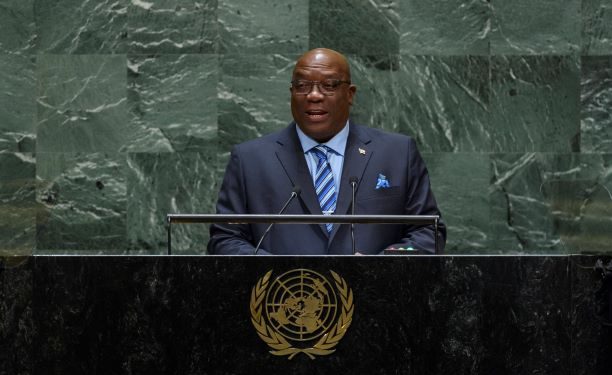BASSETERRE, St. Kitts, September 27, 2019 (Press Unit in the Office of the Prime Minister) – Prime Minister of St. Kitts and Nevis, Dr. the Honourable Timothy Harris, one of the leading voices and advocates on climate change in the Caribbean, again used his platform at the United Nations General Assembly to draw the international community’s attention to the growing threats of climate change and their far-reaching impacts on developing nations.
In a powerful address to the UN general body today, Friday, September 27, Prime Minister Harris observed that while climate change is a product of developed nations’ push for economic growth and industrialization, it is the developing nations that bear the brunt of its effects.
As such, the prime minister called on larger nations to step up their support and solidarity, and provide greater assistance to Small Island Developing States (SIDS).
“We speak out and we speak loudly because of the existential vulnerabilities that we suffer in the face of this growing threat,” Dr. Harris said. “Two years ago, my colleague Prime Minister from Dominica, Roosevelt Skerrit, was at this podium, dispirited but dignified, straight from the frontline of the devastation that was Hurricane Maria. Yesterday Dominica; today the Bahamas. Every hit is more devastating than that which preceded it.”
Prime Minister Harris joined his voice with that of St. Lucia’s Prime Minister, Allen Chastanet to support the effort to establish a SIDS Foundation for climate adaptation and mitigation.
“We are tired of those who posture as champions of our cause but substantially are promoters of their own conceit. We are tired of the agencies whose brokerage of climate funds is more centered on implementation fees than on adaptation impact. Rebuilding needs to start as soon as the disasters have passed, and we require a quicker process which is sensitive to recovery. We are tired, Mr. President, of empty promises.”
The St. Kitts and Nevis leader urged the world leaders to take a stand now and reinforced the call from the scientific community for limiting temperature rise to 1.5 degrees Celsius “if we are to stabilize global climate.”
Dr. Harris continued, “Exceeding 1.5 degrees Celsius would mean ever increasing climate risks: extreme weather, sea level rise, increased poverty and a threat to hundreds of millions of lives. Limiting global warming to 1.5 degrees Celsius for SIDS is not optional. It is a matter of our collective survival.”









